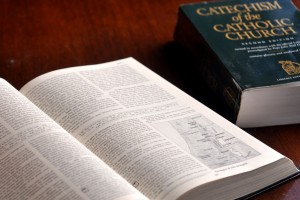Thinking Liturgically: The Scriptures
 Whatever Mass we attend here in the Roman Rite is broken up into two parts: The Liturgy of the Word, and the Liturgy of the Eucharist. There are endless debates in reform communities over which is more “important”, and that debate bores me. It really isn’t Catholic to say one part of Mass is more important than the other. While that exists within rigid theology manuals, the Mass makes the entire life of Christ present, from his preaching to his death on the Cross, to even his Resurrection. While it is true only the Eucharist provides sacramental grace, we cannot overlook the way we encounter Christ in the liturgical readings, and how those readings play a vital role in forming us to properly receive the Eucharist.
Whatever Mass we attend here in the Roman Rite is broken up into two parts: The Liturgy of the Word, and the Liturgy of the Eucharist. There are endless debates in reform communities over which is more “important”, and that debate bores me. It really isn’t Catholic to say one part of Mass is more important than the other. While that exists within rigid theology manuals, the Mass makes the entire life of Christ present, from his preaching to his death on the Cross, to even his Resurrection. While it is true only the Eucharist provides sacramental grace, we cannot overlook the way we encounter Christ in the liturgical readings, and how those readings play a vital role in forming us to properly receive the Eucharist.
In order to really grasp this, we need to understand what the Scriptures are, and why they are included in the Mass. Often the Scriptures are presented as simply a reading of a book. A very enlightened book, but a book nonetheless. The traditional teaching on Scripture has a far deeper meaning.
The first thing we need to realize is that the Scriptures are God speaking to us. When Christ debated the Pharisees, he did not say “have you not read what was written down in Leviticus, chapter 19:23” but rather “have you not read what was spoken to you by God?” When the Scriptures are proclaimed, God is speaking in your midst. I want that to sink in for my readers today. When you are at Mass next, you will hear God speaking to you in the Scriptures. The same God whose very words caused creation to come into being. At the end of time, God will but speak a word, and heaven and earth as we know it will be fundamentally changed. We know from Isaiah that when God speaks, His word leads directly to its fulfillment. (Is 55:11)
What is that word seeking to accomplish? To say it is looking to transform us is a cliche. How is it looking to transform us? Leo XIII gives a particularly moving view of Scripture when he states in Providentissimus Deus that the Sacred Scriptures are “a Letter, written by our heavenly Father, and transmitted by the sacred writers to the human race in its pilgrimage so far from its heavenly country.” When somebody is away from home for a prolonged period of time, they love to hear about home in letters or a phone call. They want to hear what it’s like. Sometimes the soldier wants to hear something good about home so he can remember what it is exactly that he is fighting for during all the chaos.
The Scriptures serve this purpose for the Christian. All throughout its pages our heavenly home is described. We hear stories about saints already in heaven. We hear about the virtues that are practiced in heaven, virtues we are called to emulate. Most importantly, in the Holy Gospels we hear Our Lord telling us how our actions on earth help us to journey back home.
While this story is one you might be familiar with, I’d like to suggest another way of looking at the Scriptures that might be helpful. As Dr. Scott Hahn exhaustively demonstrated in his book The Lambs Supper, Holy Mass is more than just a worship service here on Earth. At Mass, heaven and earth are joined. We participate in the heavenly worship that exists outside of time. I think when we look at it from this perspective (and keeping in mind the words of Leo), the positioning of the readings make sense. If the Scriptures are a letter reminding us of our heavenly home, they are something we hear right before we experience that heavenly home.
Most importantly, that little taste of our heavenly home reaches its zenith within the Holy Eucharist. In the Eucharist we receive the true bread from heaven. If the Scriptures are a reminder of home, within the Mass they are a reminder of the Eucharist. They remind us of heaven from which the Eucharist comes. They remind us of the virtues we must practice if we are to receive that taste of heaven worthily and properly. Most importantly, they remind us of the immense love that represents what heaven is: a love in which God did not spare His own life so that you could live, and live abundantly. When looked at from this perspective, I submit that we should never speak of a Liturgy of the Word separate from or inferior to the Liturgy of the Eucharist. The liturgy of the Word, with its proclamation of the Scriptures makes it possible for us to enter into the Eucharist, and is one final reminder of our purpose as Christians before being exposed to the grace of God in the Eucharist.

